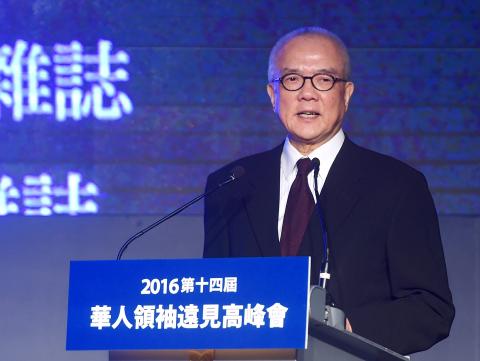Robert Wu (吳清友), chairman and founder of Eslite Corp (誠品), one of the largest retail bookstore chains in Taiwan, yesterday died of heart failure at the age of 66, the company said in a stock exchange filing.
Wu was reportedly taken to Taipei Medical University Hospital at about 7pm, but was later pronounced dead, the hospital said, without giving a cause of death.
Wu reportedly had chronic heart conditions and underwent three surgeries since 1988.

Photo: Chien Jung-fong, Taipei Times
Wu’s daughter, Mercy Wu (吳旻潔), the company’s vice chairwoman, was seen at the hospital.
She did not comment.
A special board meeting would be called to elect a new chairperson, the company said.
Eslite was established in 1989, with its first bookshop in Taipei’s Daan District (大安) on Dunhua S Road, with a focus on art and humanities-related books.
The company expanded to 48 stores, one children’s bookstore, and four music stores in Taiwan. Most of its target market is in urban areas.
Eslite was the first bookstore to set up a 24-hour service in Taiwan, at its Dunhua store, which became a popular meeting place.
The first Eslite Bookstore outside Taiwan opened in Hysan Place in Causeway Bay, Hong Kong, in 2012.
Eslite also has branches in China. Competitors have tried to copy its successful business model.
Under Robert Wu’s leadership, the bookstore chain has also expended into construction, retail, hospitality, restaurant and wine businesses.

Intelligence agents have recorded 510,000 instances of “controversial information” being spread online by the Chinese Communist Party (CCP) so far this year, the National Security Bureau (NSB) said in a report yesterday, as it warned of artificial intelligence (AI) being employed to generate destabilizing misinformation. The bureau submitted a written report to the Legislative Yuan in preparation for National Security Bureau Director-General Tsai Ming-yen’s (蔡明彥) appearance before the Foreign Affairs and National Defense Committee today. The CCP has been using cognitive warfare to divide Taiwanese society by commenting on controversial issues such as Taiwan Semiconductor Manufacturing Co’s (TSMC, 台積電) investments in the

INVESTIGATION: The case is the latest instance of a DPP figure being implicated in an espionage network accused of allegedly leaking information to Chinese intelligence Democratic Progressive Party (DPP) member Ho Jen-chieh (何仁傑) was detained and held incommunicado yesterday on suspicion of spying for China during his tenure as assistant to then-minister of foreign affairs Joseph Wu (吳釗燮). The Taipei District Prosecutors’ Office said Ho was implicated during its investigation into alleged spying activities by former Presidential Office consultant Wu Shang-yu (吳尚雨). Prosecutors said there is reason to believe Ho breached the National Security Act (國家安全法) by leaking classified Ministry of Foreign Affairs information to Chinese intelligence. Following interrogation, prosecutors petitioned the Taipei District Court to detain Ho, citing concerns over potential collusion or tampering of evidence. The

‘COMPREHENSIVE PLAN’: Lin Chia-lung said that the government was ready to talk about a variety of issues, including investment in and purchases from the US The National Stabilization Fund (NSF) yesterday announced that it would step in to staunch stock market losses for the ninth time in the nation’s history. An NSF board meeting, originally scheduled for Monday next week, was moved to yesterday after stocks plummeted in the wake of US President Donald Trump’s announcement of 32 percent tariffs on Taiwan on Wednesday last week. Board members voted to support the stock market with the NT$500 billion (US$15.15 billion) fund, with injections of funds to begin as soon as today. The NSF in 2000 injected NT$120 billion to stabilize stocks, the most ever. The lowest amount it

NEGOTIATIONS: Taiwan has good relations with Washington and the outlook for the negotiations looks promising, Minister of Economic Affairs J.W. Kuo said Taiwan’s GDP growth this year is expected to decrease by 0.43 to 1.61 percentage points due to the effects of US tariffs, National Development Council (NDC) Minister Paul Liu (劉鏡清) said at a meeting of the legislature’s Economics Committee in Taipei yesterday, citing a preliminary estimate by a private research institution. Taiwan’s economy would be significantly affected by the 32 percent “reciprocal” tariffs slapped by the US, which took effect yesterday, Liu said, adding that GDP growth could fall below 3 percent and potentially even dip below 2 percent to 1.53 percent this year. The council has commissioned another institution